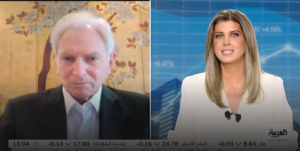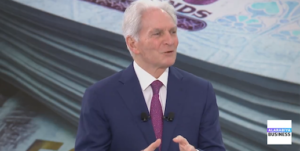This interview was published in the August issue of Gold magazine, the international investment, finance and professional services magazine of Cyprus.
Gold: Until the global financial crisis started to take hold, Cyprus appeared to be thriving. What went wrong in your view?
Nasser Saidi: Cyprus, like other countries that have joined the EU and the eurozone, went on a borrowing spree as a result of facing lower borrowing costs. It was deemed by Russian and other capital as more permissive and more lightly regulated compared to other financial centres in the EU, while benefiting from an implicit EU guarantee. Public debt increased from close to 65% of GDP in 2006 to 85.8% of GDP in 2012 – on the eve of the crisis. The latest estimates, as of Q1 2013, are that debt to GDP is running at 86.9% compared to 74.3% in Q1 2012. Total banking assets grew to more than 900% of GDP with substantial exposure to foreign bank subsidiaries, in particular Greece. Cyprus’s crisis was inextricably linked to Greece, given its massive holdings of Greek debt and banking exposure and the economic linkages and spillover from the Greek crisis. This was a crisis waiting to happen.
Gold: Could it have been avoided?
N.S.: The writing was on the wall but the authorities failed to act in time, likely expecting to be bailed-out like other countries. Contrast this with the experience of Iceland and the resolution of its banking crisis. Iceland allowed its banks to fail, transferred domestic deposits into good banks and left foreign deposits and other claims and bad assets in the original banks, to be resolved over time. The policy decision resulted in Iceland being in political hot water (mainly from the UK). Its oversized financial sector shrank from 9.4% of GDP in 2006 to 6.1% in 2011. However, Iceland avoided a ‘socialising ‘of banking losses and transfer of insolvency from the banking sector to the government. The banking sector is no longer a drag on Iceland’s growth.
Gold: So you believe that the consequences to be suffered by Cyprus will not be similar to those in Iceland?
N.S.: Cyprus’ “solution” is a new chapter of ‘bail-ins’ as opposed to ‘bail-outs’ and sets a new standard in European bank resolution. For Cyprus this will be costly and it will mean a sharp fall in wealth, consumption and in economic activity (particularly in real estate and construction) as a result of the decline in credit, capital outflows and the contraction of the banking and financial sector. In 2012, the share of finance in output was 9.2% and of employment 5.1%. We can expect a similar shrinkage as in Iceland, with the financial sector shrinking to below 6% and to under 3.3% of employment. Eventually the Cypriot economy will recover but this will require restoration of confidence and credibility in the banking system. Importantly, this means better governance of the banking system and its regulators and strengthening of banking supervision to avoid the mistakes of the past.
Gold: What are the main lessons to be learned from the Cyprus crisis, both for Cyprus and its European partners?
N.S.: The island’s large banking system, with assets in excess of 900% of GDP, was highly concentrated with its “too big to fail and too big to save” banks. Three major lessons emerge from the Cypriot crisis:
1. Small economies with large financial centres (Iceland, Ireland, Latvia and Cyprus) and inadequate supervision and regulation are highly vulnerable to external shocks and to banks becoming hedge funds. Cyprus’ outsized offshore financial centre, with light handed regulation and low taxation, became a tax haven, with about 30% of deposits from outside the eurozone and non-resident deposits exceeding its GDP. Banking and tax policies need to ensure that the banking and financial system does not become too big in relation to the size of the economy and to limit cross-border exposure.
2. Taxing insured deposits or nationalising pension funds is a recipe for financial disaster and bank runs. Reneging on pledges destroys confidence. 3. Badly-resolved banking sector crises can threaten long-term economic prospects.
Gold: Are there any lessons regarding the structure of the proposed European banking union?
N.S.: Yes, another important lesson is that an effective eurozone banking union requires supranational supervision and a single bank resolution mechanism. So the ECB – even with a European Banking Authority exercising supervision over the eurozone banking system but without a eurozone-wide resolution authority with the necessary powers and resources – would still be forced to inject liquidity to rescue failing banks. Moral hazard would remain and national authorities would want to free ride. Similarly, a European banking union will not be sufficient to guarantee financial stability and the long-term survival of the euro, since not all crises originate in the banking sector, as well illustrated by the global financial crisis which originated in the housing sector.
Gold: Cyprus’ growth prospects are gloomy, at least in the short and medium term. Do you believe that the prospects arising from the exploitation of the island’s hydrocarbons will contribute satisfactorily in the long run?
N.S.: In January 2013, Cyprus did not have any proven reserves of oil or natural gas. However, the recent offshore discovery of natural gas resources – with additional exploration on the horizon – has the potential to significantly alter the nation’s energy sector. Cyprus has substantial offshore acreage in the Levant Basin. The IEA estimates for Cyprus are that exploiting the natural gas deposits (5 trillion and 8 trillion cubic feet) will require an investment of some $10-$12 billion over the coming 7-8 years. This is a substantial investment given the size of the Cypriot economy and will raise growth. In addition, other potential benefits would derive from providing support services to offshore facilities. Gas revenues are expected to reach $3 billion by 2020, of which $1 billion would accrue as tax to the government.
Gold: How do you view the possibility of Cyprus selling its future gas ‘product’ in advance?
N.S.: In principle, Cyprus could securitise its future gas revenue by selling rights to future gas for cash now. However, in the interest of preserving resources for future generations, Cyprus should not be tempted to use its future gas wealth to increase government spending today so as to lower the cost of adjustment to the financial crisis, such as bailing out its banks. Cyprus should aim to create a Sovereign Wealth Fund and invest oil & gas proceeds into it. One of the clear dangers of being blessed with natural resources is what is referred to as “Dutch disease” – i.e. the negative consequences arising from large foreign currency inflows that would lead to real exchange rate appreciation and adversely impact Cyprus’s international competitiveness. Instead, Cyprus should wisely invest its new natural resource wealth in building infrastructure and in its human capital, and undertake structural reforms to raise overall and labour productivity growth.
Gold: Do you believe that ending austerity will boost Europe and solve the continent’s problems? Should Europe allow its budget deficits to rise?
N.S.: Austerity has been largely ineffective in its stated goal of reducing debt levels or restoring growth in peripheral European countries, and has become a political nightmare for European governments by exacerbating the real economic consequences of the financial crisis. By slowly moving to end austerity, the eurozone periphery will have to accept higher budget deficits. But austerity and the appropriate stance of fiscal policy is a false issue in my view. Europe needs to undertake structural reforms: greater labour market flexibility and mobility, pension and entitlement programme reforms, delaying age to retirement, large scale investment in infrastructure, CAP reform, liberalising immigration and achieving greater integration of the Mediterranean, Eastern & Central Europe, while moving to greater trade and investment liberalisation with China, to name a few. In addition, developing a partnership with the Gulf countries would also benefit the eurozone. However, there is a lack of vision and political courage. Jean-Claude Junker candidly and succinctly expressed it: “We all know what to do, we just don’t know how to get re-elected after we have done it.”
Gold: What would be a “balanced” resolution of the eurozone’s difficulties?
N.S.: The eurozone is currently facing the four Rs: Restructuring, Recession, Recapitalisation and Retrenchment. To emerge stronger from this “hole”, there is need for deep reform of the banking system: recapitalisation, restructuring, the separation of commercial banking from investment banking Glass-Steagall Act style, fiscal union to accompany monetary union and the single currency. In addition, countries that cannot or do not wish to commit to structural reforms should be able to break out.
Gold: Do you believe that there is any danger of a breakup of the eurozone?
N.S.: Latvia recently received the green light to join the eurozone as its 18th member, after having met all the economic criteria. I do not foresee an imminent breakup of the eurozone but it requires new vision. Will Europe take the bold political steps to become the United States of Europe and speak with one voice? The global economic geography has undergone a tectonic shift towards Asia and the emerging markets. Instead of focusing on strengthening transatlantic ties with the US through a Transatlantic Trade and Investment Partnership, Europe should be growing its trade and investment linkages with China, India, the GCC and emerging economies. Those countries will be driving global economic growth for the foreseeable future.
Gold: Do you foresee a change or a shift in European economic and financial policy after the German elections in September, 2013?
N.S.: The upcoming German elections in September have stalled many decisions across the eurozone, including those on a banking union and on redrafting the Greek bailout, to name just two. I do not expect a major shift in economic and financial policy post-election (especially given Merkel’s current lead in the polls), but obviously it depends on the outcome. The need to encourage Germany to develop a new vision for Europe is a priority. Europe has displayed a fractious political landscape, unequal to the challenges. However, it seems unlikely that much will be accomplished before 2016 given the European elections in 2014, municipal elections in France, the appointment of a new European Commission and then British elections in 2015.
A New Vision is Need for Europe: Nasser Saidi
14 August, 2013
read 6 minutes
Read Next
media page
“Economic diversification is the GCC’s top priority”, Op-ed in Arabian Gulf Business Insight (AGBI), 3 Apr 2024
The opinion piece titled “Economic diversification is the GCC’s top priority” appeared in the Arabian
4 April, 2024
TV and radio
Interview with Al Arabiya (Arabic) on Fed interest rates, 20 Mar 2024
In this interview with Al Arabiya aired on 20th March 2024, Dr. Nasser Saidi discusses
21 March, 2024
TV and radio
Interview with Al Arabiya (Arabic) on Egypt’s interest rate hike, currency floatation & IMF deal, 7 Mar 2024
In this interview with Al Arabiya aired on 7th March 2024, Dr. Nasser Saidi discusses
8 March, 2024





